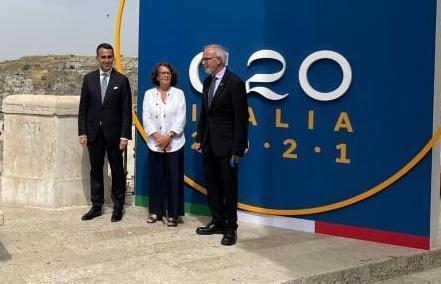
- Werner Hoyer endorses G20 Italian Presidency focus on food security in COVID-19 recovery
- EIB commits to support delivery of Sustainable Development Goals at local level as part of Team Europe and international efforts
Participating in the first-ever joint G20 Foreign Affairs-Development Ministerial Meeting, EIB President Werner Hoyer has endorsed the G20 Italian Presidency’s focus on the achievement of the United Nations’ Sustainable Development Goals (SDGs).
President Hoyer also spoke at the Ministerial Development Sessions in the Italian city of Matera where he pledged that the EIB, owned by the 27 Member States of the European Union, would step up its efforts to help G20 leaders deliver the 2030 Zero Hunger Goal as well as to enable municipalities in developing and emerging economies to turn the SDGs into a reality for communities on the ground.
Concern that the pandemic has shifted focus away from the Sustainable Development Agenda has prompted today’s meetings - held under the leadership of Luigi Di Maio, Italy’s Minister of Foreign Affairs and International Cooperation, and Marina Sereni, Vice Minister of Foreign Affairs and International Cooperation.
Werner Hoyer, President of the European Investment Bank (EIB) said:
“I welcome the G20 Italian Presidency’s focus on the sustainable development agenda which is at the heart of our mission as the EU Bank. We cannot allow COVID-19 to derail our efforts to deliver the Sustainable Development Goals.”
“At the EIB, our strength is in creating real impact on the ground through each Euro that we channel into projects. We aim to increase that impact and to harness our role as an investment bridge between EU policies and projects on the ground, and to respond to the growing demand for a stronger partnership between Europe and the world.”
He added, “The recovery will be a time of major transformations: political, economic, social and demographic. With these transformations, developing countries will require a large increase in access to energy, water and food. If we let this happen with the current production methods and technologies, the Sustainable Development and Paris Goals will go up in smoke – quite literally. Alternatively, we can learn from previous transitions and provide clarity, purpose and active support.”
The Sustainable Healthcare Industry for Resilience in Africa or SHIRA, was also underlined by President Hoyer as a highly promising new financing platform to support health security and resilience in Africa by facilitating the financing of new private sector investment in health manufacturing and supply capacity, as well as health services.
As part of the Team Europe effort, SHIRA was launched by the EIB and European Development Finance Institutions in cooperation with the African Development Bank earlier this month.
On the issue of food security President Hoyer said: “Today, unsustainable expansion and intensification of agriculture in some areas coexist with difficulties in re-distribution and unreliable food production capacity in others. Beyond that, the biological potential of land and the ocean to sustainably produce food and biomass will be severely affected by climate change.
At the same time, if managed sustainably, the bioeconomy can be a great ally for decarbonisation: it can sequester huge amounts of greenhouse gases, at relatively low cost. Let us not forget that 50% of global GDP depends on natural assets and biodiversity.
Besides their ecological importance, rural development and the bioeconomy are crucial for addressing the socioeconomic divide at regional and international level. At the EIB, we have invested EUR 33 billion in the sustainable bioeconomy over the last 5 years.
We are focusing on food quality and security, sustainable and inclusive rural development, climate-smart production, innovation, resource efficiency and forestry, and we’ve delivered our support through a broad range of financing instruments and parallel technical assistance programmes.”
Today’s discussions in Matera also highlighted the key role of cities, especially in developing and emerging economies in helping to deliver the SDGs and the Paris Climate Agreement. As the EU Climate Bank, the EIB is partnering on a number of initiatives aimed at addressing financing and technical obstacles faced by cities. One of them is the City Climate Finance Gap Fund where the EIB is working with the World Bank and the Luxembourg and German governments, alongside city networks such as the Global Covenant of Mayors, to get transformative local climate action projects off the ground in developing countries.
President Hoyer said, “We need innovative solutions – at scale. This is very clear in digital and climate. And this is particularly true for local authorities that serve local communities. More than finance is needed. We must support the capacity to transform ideas into viable projects. This is why, together with the World Bank, the Governments of Germany and Luxembourg, and the Global Covenant of Mayors, we launched the City Climate Finance Gap Fund, to support climate action projects in cities in developing countries”.
Background information
About the European Investment Bank
The European Investment Bank (EIB) is the long-term lending institution of the European Union (EU) owned by its Member States with operations in more than 140 countries globally.
Over the last 10 years, EIB financing outside the European Union has totalled €78 billion, including €26.6 billion to Africa. In 2020, the EIB achieved record lending levels in Africa: signing EUR 5 billion - half of which was with the private sector. Over 70% of investments in Sub-Saharan Africa were in least developed countries and Fragile States. The EIB supports projects aiming at reducing poverty and promoting climate action, economic resilience and gender equality.
The EIB’s contribution to the Team Europe COVID-19 response, set up by the European Commission, is mobilising up to EUR 7.3 billion in global commitments for our partner countries.
More information on the EIB and development